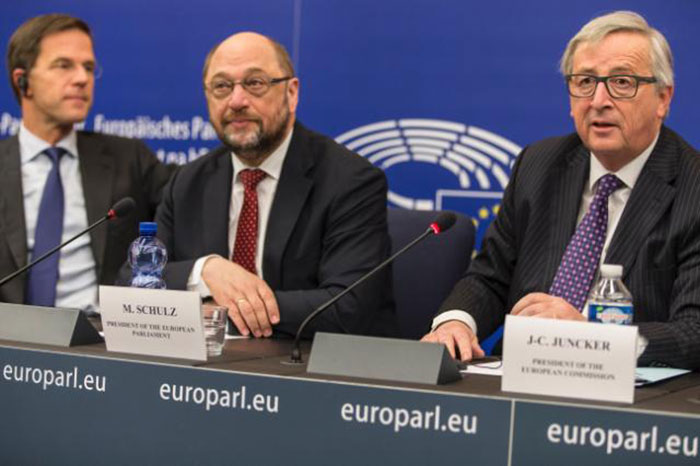“We must achieve concrete results and make sure they are visible to counter growing scepticism throughout Europe. (..) Keeping promises and sticking to agreements should be the new normal in Europe. A deal is a deal”, said Prime Minister of the Netherlands Mark Rutte in the kick-off debate of the Dutch Presidency in Strasbourg.
Mr Rutte painted a world in which younger people see the EU primarily as a source of unwarrented interference in their lives, with benefits far removed from everyday life. “Europe must be relevant to people’s daily lives. And over the next few months, the Netherlands wants to help make that happen”, he said.
Most of Parliament’s political group leaders referred to the refugee crisis. Manfred Weber (EPP, DE), ALDE-leader Guy Verhofstadt (BE) and others said that Parliament stands ready to fast-track legislative work on the European Commission proposal for a European Border and Coast guard. They urged the Council to deliver the pledged €3 billion to Turkey quickly, so that people do not flee. Gianni Pittella (S&D, IT) called on Mr Rutte to deliver the long awaited Deposit Guarantee Assurance proposal and to support corporate tax reforms in Europe so that multinational companies pay their fair share of tax where they make their profits.
Syed Kamall (ECR, UK) agreed with the Dutch focus on the economy and cutting red tape and underlined the need for a Capital Markets Union. Marcel de Graaff (EFN, NL) condemned the EU deal with Turkey on refugees, saying that the EU’s €3 billion would “end up in the pockets of the beast of Ankara”. He advised Mr Rutte to go back to The Hague and close the borders.
The refugee crisis will be a top priority for the Dutch. Mr Rutte said that the agreement with Turkey needs to be carried out fast, so as to relieve pressure on the EU’s external borders. He underlined the need to make refugee reception arrangements safe, to get external borders – especially in Greece – under control, to put “hotspots” in place and to sort out registration of refugees. “The current numbers aren’t sustainable. We are running out of time. We need a sharp reduction in the coming six to eight weeks”, he said.
Other priorities of the new Presidency include growth and employment, enhancing the stability of the Eurozone, seizing the existing opportunities in the internal market (digital and services) and cutting back “the excessive regulations that restrict people and companies”.
Commission President Jean-Claude Juncker singled out the Deposit Guarantee Scheme which is the last remaining pillar for completing the banking union. “Mr Rutte said his Presidency will fully support this”, he said. Mr Juncker also warned that Schengen is under threat, now that one country after the other is closing its borders. “The economic costs of reinstalling borders are huge. To control the connecting bridge between Sweden and Denmark would cost €300 million and the costs of delays at borders for the transport sector could amount to €3 billion. If the internal market begins to suffer, we will ask ourselves one day if we really need a single currency”. He called on the Council Presidency to speed up examining the Commission proposal for a European border – and coast guard.



